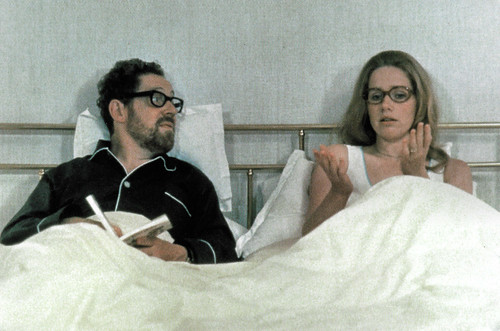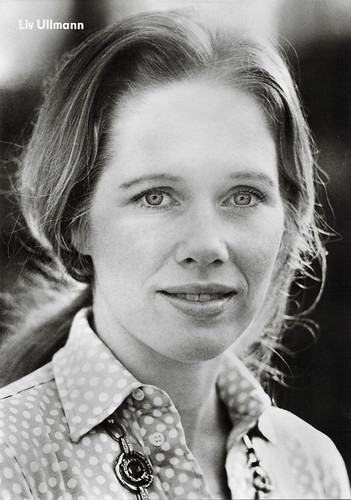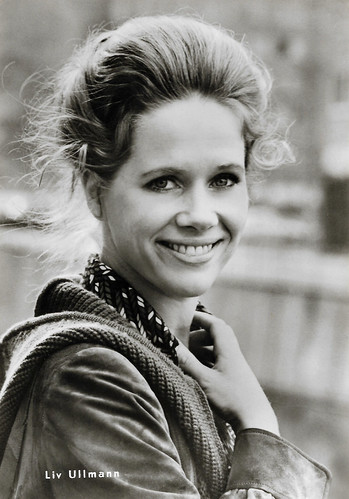
American postcard by Fotofolio, NY, NY, no. VS4. Photo: Victor Skrebneski. Caption: Liv Ullman, 1973.

French postcard for the French DVD release by Dark Star / Carlotta. Photo: Bo Arne Vibenius / AV Svenska Film Industri. Liv Ullmann and Bibi Andersson in Persona (Ingmar Bergman, 1966).

French postcard fort the French DVD release by Dark Star / Carlotta. Photo: AV Svenska Film Industr. Erland Josephson and Liv Ullmann in Scener ur ett äktenskap/Scenes from a Marriage (Ingmar Bergman, 1973).
Her breakthrough on the big screen as a silenced stage actress
Liv Johanne Ullmann (also written as Ullman) was born in Tokyo, Japan, in 1938. Her father, Ernst Viggo Ullmann, worked as a Norwegian aeronautical engineer for an American company, her mother Janna Erbe Lund was a bookseller. When she was two years old, the family moved to Toronto, Ontario, where her father worked at the Norwegian air force base on Toronto Island (in Lake Ontario) during the Second World War. The family moved to New York, where her father died of a brain tumour. Liv was six and the event affected her greatly. After the end of the war, Ullmann returned to Norway with her mother and sister. There she grew up and went to school in Trondheim.
Liv Ullmann studied acting, including in London, and applied several times in vain to the acting school at the National Theatre in Oslo. In 1957, she made her debut as an actress in the play 'The Diary of Anne Frank'. That year, she also made her film debut as an extra in the popular Norwegian comedy Fjols til fjells/Fools in the Mountains (Edith Carlmar, 1957). In 1960, she was finally accepted as an ensemble member of the National Theatre. She became noted for her portrayal of Nora in Henrik Ibsen's play 'A Doll's House'.
Ullmann was already a well-known theatre actress in her homeland when she met the Swedish director Ingmar Bergman in the mid-1960s. She made her breakthrough on the big screen with her role as a silenced stage actress in Persona (Ingmar Bergman, 1966) alongside Bibi Andersson. Ullmann and Bergman also became a couple in private life. They separated after five years but continued to work together.
Ullmann played in a highly successful series of films by Bergman, also including Vargtimmen/Hour of the Wolf (1968), Skammen/Shame (1968), En passion/The Passion of Anna (1969) with Max von Sydow and Bibi Andersson, Viskningar och Rop/Cries and Whispers (1972) with Harriet Andersson and Ingrid Thulin, Ansikte mot ansikte/Face to Face (1976), and Höstsonaten/Autumn Sonata (1978), with Ingrid Bergman.
These roles made her an international film star and icon of the 1970s. She co-acted often with Erland Josephson, with whom she made the legendary television drama Scener ur ett äktenskap/Scenes from a Marriage (Ingmar Bergman, 1973), which was also edited into a feature.
She also had a successful film career away from Bergman. Ullmann was nominated for an Oscar for her role in Utvandrarna/The Emigrants (Jan Troell, 1971) and also appeared in the sequel, Nybyggarna/The New Land (Jan Troell, 1972). Ullmann acted with Laurence Olivier in the war epic A Bridge Too Far (Richard Attenborough, 1977). She also starred in such films as the British historical drama The Abdication (Anthony Harvey, 1974) as Christina, Queen of Sweden, La diagonale du fou/Dangerous Moves (Richard Dembo, 1984) starring Michel Piccoli and the drama The Rose Garden (Fons Rademakers, 1989) with Maximilian Schell and Peter Fonda.

East German postcard by Progress Film-Verleih, Berlin, no. 46/77. Photo: Günter Linke.

East German postcard by Progress Film-Verleih, Berlin, no. 123/79. Photo: Günter Linke.
Bringing back the characters of Johan and Marianne after 30 years
Since 1992, Liv Ullmann has also been active as a director. She made her feature film debut as a director with the Danish film drama Sofie (1992), which received several awards. Her best-known film is Trolösa/Faithless (2000), after an (autobiographical) screenplay by Ingmar Bergman. It was shown in the competition at the Cannes International Film Festival. Her directorial work reunited her with Bergman actors Max von Sydow and Erland Josephson as well as Bergman's cinematographer Sven Nykvist.
After a long career, Liv Ullmann stopped acting in 1994. In 2003, she made a comeback in the television film Sarabande/Saraband (Ingmar Bergman, 2003), opposiite Erland Josephson. The story is a sequel to Ingmar Bergman's Scener ur ett äktenskap/Scenes from a Marriage (1973), bringing back the characters of Johan and Marianne. It was her first film in 25 years with Bergman and the last film directed by him.
Liv Ullmann has won a long series of film and theatre awards, including a Golden Globe for best actress in 1971 and several oeuvre awards, including from the European Film Awards in 2004. She also received two Oscar nominations for best actress, for her roles in Utvandrarna/The Emigrants (Jan Troell, 1971) and Ansikte mot ansikte/Face to Face (Ingmar Bergman, 1976).
She was twice nominated for Broadway's Tony Awards: in 1975, as Best Actress (Play) for a revival of 'A Doll's House', by Henrik Ibsen, and in 1977, as Best Actress (Play) for a revival of 'Anna Christie', by Eugene O'Neill. In 1977, Ullmann was appointed to the Norwegian Royal Order of St. Olaf and in 2006, she received an honorary doctorate from the Technical and Scientific University of Norway.
Ullmann was the jury president of the 2001 Cannes Film Festival and the 1984 Berlin International Film Festival. She has written two autobiographies, 'Changing' and 'Choices'. She also worked on a number of film scripts, including a film adaptation of Henrik Ibsen's famous play 'A Doll's House'. She has also been active as an ambassador for UNICEF and honorary president of the Women's Commission for Refugee Women and Children.
Liv Ullmann married and divorced twice. Her first husband was the psychiatrist Hans Joacob 'Gappe' Stang (1960-1965) and the second one was the estate agent Donald Saunders (1985-1995). Her daughter with Ingmar Bergman, the writer Linn Ullmann, was born in 1966 as Karin Beate Ullmann.
In 2002, doctors diagnosed Liv Ullman with a stroke and a life-threatening opening of a ventricle. After surgery, she made a full recovery. In 2013, she directed a film adaptation of August Strindberg's play 'Fröken Julie'. Miss Julie (2014), stars Jessica Chastain, and Colin Farrell, and was widely praised by the Norwegian press.

Vintage photo.

Vintage postcard. Liv Ullmann and Erland Josephson in Scener ur ett äktenskap/Scenes from a Marriage (Ingmar Bergman, 1973).

East German postcard by Progress Film-Verleih, Berlin, no. 32/76. Photo: Günter Linke.
Sources: Volker Boehm (IMDb), Wikipedia (Dutch, German and English), and IMDb.
No comments:
Post a Comment